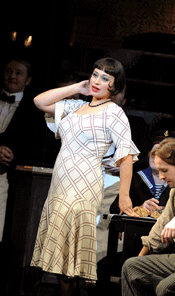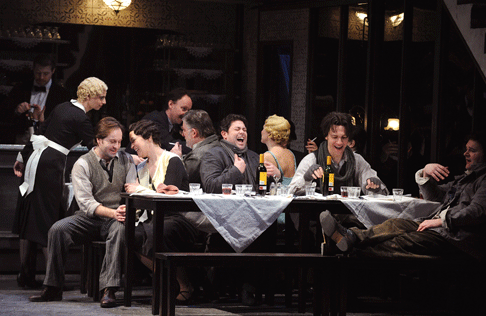Recently in Reviews
English Touring Opera are delighted to announce a season of lyric monodramas to tour nationally from October to December. The season features music for solo singer and piano by Argento, Britten, Tippett and Shostakovich with a bold and inventive approach to making opera during social distancing.
This tenth of ten Live from London concerts was in fact a recorded live performance from California. It was no less enjoyable for that, and it was also uplifting to learn that this wasn’t in fact the ‘last’ LfL event that we will be able to enjoy, courtesy of VOCES8 and their fellow vocal ensembles (more below …).
Ever since Wigmore Hall announced their superb series of autumn concerts, all streamed live and available free of charge, I’d been looking forward to this song recital by Ian Bostridge and Imogen Cooper.
The Sixteen continues its exploration of Henry Purcell’s Welcome Songs for Charles II. As with Robert King’s pioneering Purcell series begun over thirty years ago for Hyperion, Harry Christophers is recording two Welcome Songs per disc.
Although Stile Antico’s programme article for their Live from London recital introduced their selection from the many treasures of the English Renaissance in the context of the theological debates and upheavals of the Tudor and Elizabethan years, their performance was more evocative of private chamber music than of public liturgy.
In February this year, Albanian soprano Ermonela Jaho made a highly lauded debut recital at Wigmore Hall - a concert which both celebrated Opera Rara’s 50th anniversary and honoured the career of the Italian soprano Rosina Storchio (1872-1945), the star of verismo who created the title roles in Leoncavallo’s La bohème and Zazà, Mascagni’s Lodoletta and Puccini’s Madama Butterfly.
Evidently, face masks don’t stifle appreciative “Bravo!”s. And, reducing audience numbers doesn’t lower the volume of such acclamations. For, the audience at Wigmore Hall gave soprano Elizabeth Llewellyn and pianist Simon Lepper a greatly deserved warm reception and hearty response following this lunchtime recital of late-Romantic song.
Collapsology. Or, perhaps we should use the French word ‘Collapsologie’ because this is a transdisciplinary idea pretty much advocated by a series of French theorists - and apparently, mostly French theorists. It in essence focuses on the imminent collapse of modern society and all its layers - a series of escalating crises on a global scale: environmental, economic, geopolitical, governmental; the list is extensive.
For this week’s Live from London vocal recital we moved from the home of VOCES8, St Anne and St Agnes in the City of London, to Kings Place, where The Sixteen - who have been associate artists at the venue for some time - presented a programme of music and words bound together by the theme of ‘reflection’.
'Such is your divine Disposation that both you excellently understand, and royally entertaine the Exercise of Musicke.’
Amongst an avalanche of new Mahler recordings appearing at the moment (Das Lied von der Erde seems to be the most favoured, with three) this 1991 Mahler Second from the 2nd Kassel MahlerFest is one of the more interesting releases.
‘And there was war in heaven: Michael and his angels fought against the dragon; and the dragon fought and his angels, And prevailed not; neither was their place found any more in heaven … that old serpent … Satan, which deceiveth the whole world: he was cast out into the earth, and his angels were cast out with him.’
If there is one myth, it seems believed by some people today, that probably needs shattering it is that post-war recordings or performances of Wagner operas were always of exceptional quality. This 1949 Hamburg Tristan und Isolde is one of those recordings - though quite who is to blame for its many problems takes quite some unearthing.
There was never any doubt that the fifth of the twelve Met Stars Live in Concert broadcasts was going to be a palpably intense and vivid event, as well as a musically stunning and theatrically enervating experience.
‘Love’ was the theme for this Live from London performance by Apollo5. Given the complexity and diversity of that human emotion, and Apollo5’s reputation for versatility and diverse repertoire, ranging from Renaissance choral music to jazz, from contemporary classical works to popular song, it was no surprise that their programme spanned 500 years and several musical styles.
The Academy of St Martin in the Fields have titled their autumn series of eight concerts - which are taking place at 5pm and 7.30pm on two Saturdays each month at their home venue in Trafalgar Square, and being filmed for streaming the following Thursday - ‘re:connect’.
The London Symphony Orchestra opened their Autumn 2020 season with a homage to Oliver Knussen, who died at the age of 66 in July 2018. The programme traced a national musical lineage through the twentieth century, from Britten to Knussen, on to Mark-Anthony Turnage, and entwining the LSO and Rattle too.
With the Live from London digital vocal festival entering the second half of the series, the festival’s host, VOCES8, returned to their home at St Annes and St Agnes in the City of London to present a sequence of ‘Choral Dances’ - vocal music inspired by dance, embracing diverse genres from the Renaissance madrigal to swing jazz.
Just a few unison string wriggles from the opening of Mozart’s overture to Le nozze di Figaro are enough to make any opera-lover perch on the edge of their seat, in excited anticipation of the drama in music to come, so there could be no other curtain-raiser for this Gala Concert at the Royal Opera House, the latest instalment from ‘their House’ to ‘our houses’.
"Before the ending of the day, creator of all things, we pray that, with your accustomed mercy, you may watch over us."
Reviews
![Melody Moore (Mimì) and Alfie Boe (Rodolfo) [Photo: Tristram Kenton]](http://www.operatoday.com/La_Boheme_007.gif)
05 Mar 2009
La bohème — English National Opera
Jonathan Miller's new production of Puccini's wintry opera was denied its planned opening night on Monday 2nd February by a bout of unusually heavy snow which brought most of London's transport services to a halt and turned it into a virtual ghost town (thus, up the road at Covent Garden, the cancellation of a performance of Korngold's 'Die tote Stadt' was equally ironic).
As a staging, it has all the hallmarks of a future classic of the ENO repertoire. Isabella Bywater’s naturalistic set is as easy on the eye as Amanda Holden’s fluid new translation is on the ear, while Jean Kalman’s lighting handsomely sets off the wide attic windows and silhouetted rooftops. Fast-forward a couple of seasons to an above-average revival; the rough edges of the staging will have been smoothed over, the perfect cast will be engaged, and everything will ‘click’. The previous production - which was less distinctive than this - was memorable thanks to a succession of lively and well-matched ensembles of soloists.
That, alas, was what this new production lacked. As Mimì, the sweet but pallid soprano of the American soprano Melody Moore lacked warmth and passion; Alfie Boe was a fine Rodolfo a few years ago at Glyndebourne, but that’s a much smaller house, and his is not a large voice - he was frequently swallowed up by the orchestral texture. But a much greater problem was their credibility as a couple, with almost no chemistry between them. Admittedly the costumes were unhelpful: Moore has youth on her side, but a dowdy wig and unflattering dresses made her matronly and plain, not to mention improbably strong and healthy for a fragile heroine whose very identity is defined by a diminutive pet-name. In comparison to the small-framed Boe’s amiable and boyish Rodolfo, Moore’s Mimì seemed like a sensible elder sister.
 Hanan Alattar (Musetta)
Alfie Boe (Rodolfo)
Hanan Alattar (Musetta)
Alfie Boe (Rodolfo)
Musetta, Hanan Alattar, somehow failed to dominate Act 2, and her sharply focused soprano remained pert and hard-edged right up to the end, though her characterisation gained in warmth and was quite touching. Best among the soloists was the congenial, warm-voiced Roland Wood as Marcello, and Pauls Putninš’ distinctive bass brought considerable pathos to Colline.
The set - with buildings that revolve into various configurations to create the various locations - evokes a down-at-heel 1930s Paris. Appropriately, the garret scenes take place on an upper level, which caused a few acoustic issues from where I was sitting in the Stalls. The cast were sometimes overwhelmed by the orchestra, particularly in the fast-moving banter of Act 1. It wasn’t until Act 3, when the soloists are at ground level and not lost in the ensemble, that the vocal projection was really satisfactory. The split level creates a dramatic issue too, with the staircase up to the Bohemians’ doorway forming the focal point of the set: none of the entrances are a surprise, from Benoit’s in Act 1 to Musetta’s in Act 4. The sole purpose of its central placement seems to be to throw focus on Schaunard (David Stout) towards the end as he leaves Rodolfo and Mimì alone.
 Alfie Boe (Rodolfo), Melody Moore (Mimì), David Stout (Schaunard), Pauls Putnins (Colline), Roland Wood (Marcello)
Alfie Boe (Rodolfo), Melody Moore (Mimì), David Stout (Schaunard), Pauls Putnins (Colline), Roland Wood (Marcello)
In his house debut, conductor Miguel Harth-Bedoya gave a musically competent, lucid reading, but it was short on warmth and there was little sense of connection between pit and stage.
I mustn’t ignore the positives: Simon Butteriss’s sleazy Benoit was a highly entertaining cameo, and Act 3 was really well-staged, with well-directed cameos from members of the chorus and (finally) some believable emotional interplay between the two couples. But at the end of the evening, though I found myself sorry for Mimì’s death, I was quite indifferent to Rodolfo’s loss. If only I could have believed they were ever in love.
Ruth Elleson © 2009
![Melody Moore (Mimì) and Alfie Boe (Rodolfo) [Photo: Tristram Kenton]](http://www.operatoday.com/La_Boheme_007.gif)

